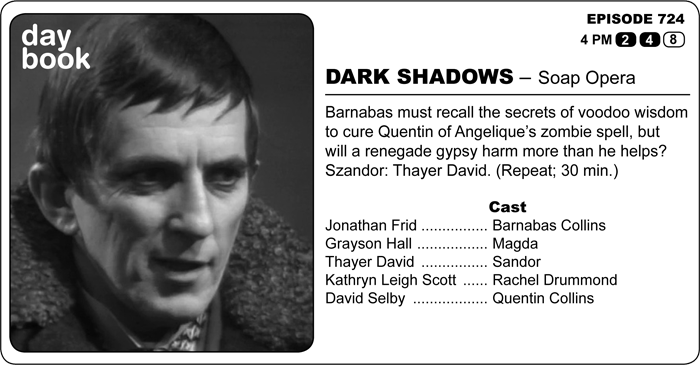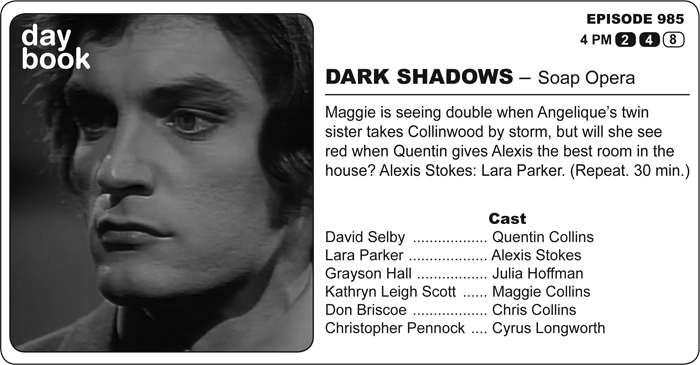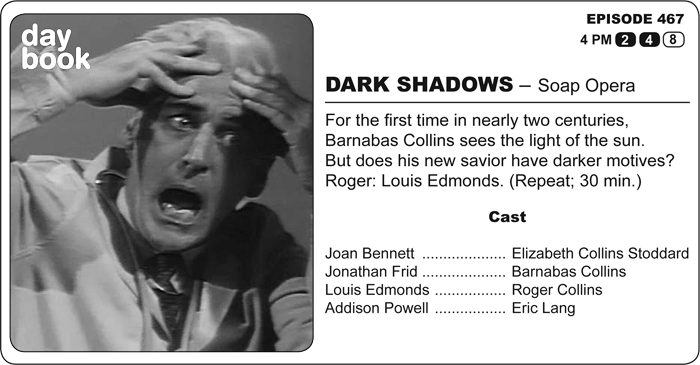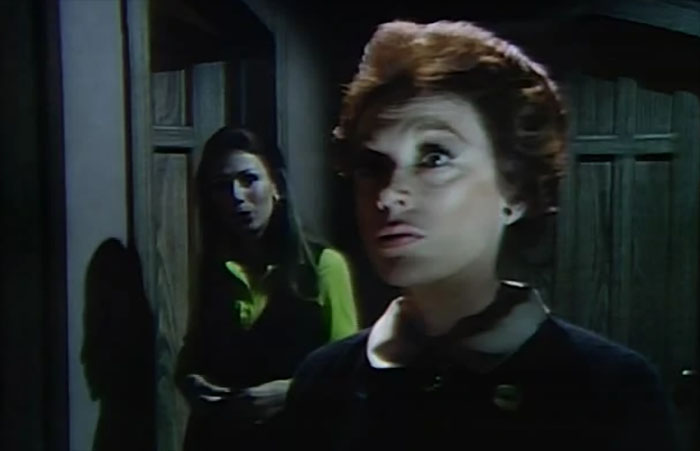
By PATRICK McCRAY
Taped on this day in 1970: Episode 985
Maggie thinks she’s seeing double when Angelique’s twin sister arrives… but is she? Maggie Collins: Kathryn Leigh Scott. (Repeat; 30 min.)
Maggie is stunned to find someone she assumes to be Angelique in her home. She is told that it’s Angelique’s sister, Alexis, but no one at Collinwood seems to shake the feeling that the former mistress has returned. Maggie and Quentin row over the new guest, and Maggie leaves.
Best moment of acting on the show, apologies to everyone else. And by the show, I mean all 1225 episodes. Kathryn Leigh Scott and David Selby end the episode with a fiery argument about whether or not Angelique has returned or if it's really just her twin sister, Alexis.
There are moments in acting where everything but the actual moment of total communication completely vanishes. There's no planning. Seemingly no script. The actor is as completely absorbed in the given circumstances and connection with their scene partner as is the most transfixed audience member. You might have heard of the concept of "in the moment." Sounds pretentious? It isn't. It is a moment like this.
Scott is a highly intelligent person. Vastly culturally literate and perceptive about the nuances of human behavior. In her choices, she is also a hell of a chess player. She owns every moment when she is on screen. She is not one for accidents. The final scene in this episode combines that kind of creative ownership with total creative freedom that the rigors of the show’s precision usually deny the performers. It's normally about saying lines and hitting marks with an accuracy demanded by being live on tape with minimal preparation. It doesn't allow for that almost supernatural spontaneity. This moment does. It's not just about raised voices and Selby's bombast. This is about actually BEING.
It's often a mystery... how these moments come about. Olivier wept after certain performances because he had no idea how he achieved them. When Scott departs Collinwood, you hear a voice never before experienced on the series. There is an edge that is totally fresh, totally new, and totally about communicating with Selby at that moment. And she means it.
It goes by in a flash, but it's worth really appreciating.
Overall, Parallel Time is one of the show's least effective storylines because of its failure to live up to the concept. Where do the universes deviate? Where don't they? The writers hide behind, "This isn't science fiction," too much with this. Nowhere is this truer than the moment when Cyrus quotes Shakespeare. Why not attribute it to Marlowe, guys? Have a little fun with the PT concept. It's possible to have those Easter Eggs as flavoring without being a slave to science fiction. It's a general rule that if you play to the dumbest guy in the room, you'll have the dumbest show in town. Given that, if you play to the most average guy in the room, well, you get my point.
This episode focuses on the abstracts of good and evil more dedicatedly than most on the show. Of course, any Jekyll & Hyde story is apt to. I'm getting ahead of myself, but I'm not sure that Yaeger is as much evil as liberated from the yoke of consequences. Why need he be? He's a tourist in Longworth's body. He exhibits too much joy... Longworth, too little. I can see scenarios where he has a great weekend in New York, as long as no one gets in his way.
If there's a monster in the episode, and in all of PT, it's not Angelique. Nor Stokes. Nor Yaeger. Nor any of the ostensible suspects. On a primal level, it's Quentin, that most violent of good guy husbands. The only thing that strains my credulity in the episode is that he doesn't slap Maggie into next week.
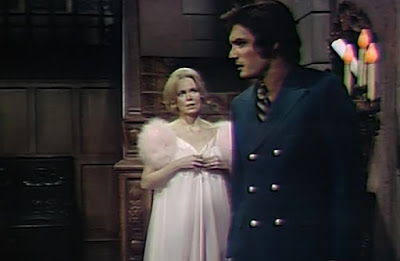 Not that he should.
Not that he should.But with a temper that volcanic and self-assured, in an age where That's The Way Things Were, I feel like PT Quentin is cutting short of where he really seems to want to go. He's an unreasoning, privileged, overly confident bully with an anger management problem that is more readily found in kaiju. And THAT, my friends, is a monster. Because that monster is real. The most astonishing OTHER element in the episode is that Maggie actually leaves him.
That is the fantasy element of the series because too few victims of domestic abuse find Maggie's strength. Dark Shadows wasn't an engine of social change. But in this one instance, I can only hope that someone out there was inspired by her example. And what am I saying? Day ain't over yet. Perhaps someone is being inspired right now.
No Quentin is worth it.
This episode hit the airwaves April 3, 1970.

